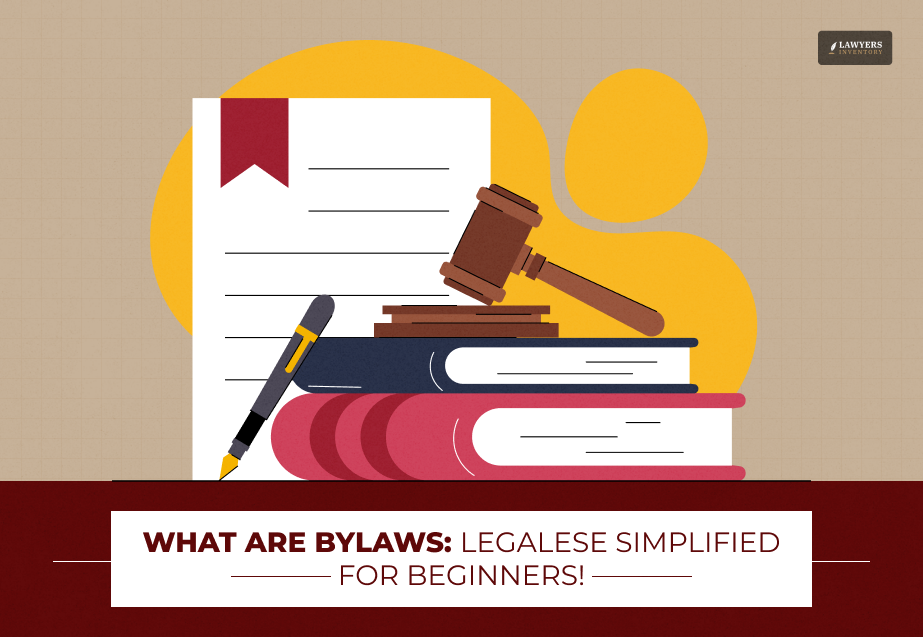
While learning about laws, several things might come to your mind. And one of the most asked questions is, “what are Bylaws?”
Bylaws are sets of rules and regulations governing an organization’s internal operations. It can be a corporation, nonprofit organization, or even an association.
Bylaws have a blueprint stating how the organization will carry on its affairs. Additionally, it also outlines how organizations will make decisions and establish their working principles.
However, is that all?
If you are trying to learn more about it in detail, you have reached the right place. Therefore, keep on reading this blog till the end to learn more…
What Are Bylaws: Understanding Their Purpose in Detail
Bylaws outline the rights, procedures, and responsibilities of all members, directors, officers, and organizations’ committees. Additionally, these laws provide a systematic framework and ensure organizational transparency and accountability.
Bylaws ensure that the organization is legally compliant. They are tailored to fit the specific needs of each organization. Business laws for nonprofit organizations are all different from those of for-profit organizations.
Bylaws are flexible and allow the establishment of structures and voting procedures that best fit the needs of that particular body.
These lay down the roles and responsibilities of all stakeholders within an organization. They also lay down very clear guidelines for the board of directors’ powers, duties, and terms of office.
These laws can be amended according to the needs of the organization. However, to pass these amendments, specific voting procedures may be required to protect the rights of individuals.
Furthermore, bylaws also serve as a reference point that guides disputes and conflicts within the organization.
Besides, external agencies, government bodies, regulator authorities, and banks often require bylaws to establish orderly conduct in their affairs.
Additionally, all organizations need to draft bylaws carefully. They should regularly review these laws and ensure that they remain up-to-date and well-aligned with the goals and legal requirements of the organization.
Do Bylaws Have Any Effect?
Bylaws may sound like some legally complex thing that, not in a million years, could affect your life. But is it that far away from your daily life events? Let’s find out.
Bylaws are rules and regulations that local governments or organizations create to help manage and govern a community or a specific area.
For example, it might state that loud music should not be played after 10 PM so people can sleep peacefully without disturbance. Here are some effects that bylaws have on you:
- They Help in Keeping the Environment Safe: For example, a by-law may make throwing trash in public parks punishable. This ensures a clean environment and protects wildlife from harmful waste.
- These are Responsible for Protecting Public Spaces: For example, a local body might set rules for using sports fields, like reserving them in advance, so that everyone gets a fair chance to enjoy them.
- They Can Check Building and Construction Standards: For example, laws may require builders to use sturdy materials and follow specific safety guidelines, ensuring homes are strong and secure.
- By-Laws Check Business Activities: Have you ever felt disturbed by the commotion made by a business nearby? Well, by-laws can make sure that doesn’t happen. They could specify where food trucks are allowed to operate, ensuring they don’t block traffic or disturb neighborhoods.
- They Provide Relief By Managing Traffic and Transportation: These regulations set speed limits in school zones, protecting children and ensuring a safe environment around schools.
- By-Laws Look Out For Your Pets, Too: One such by-law might require dogs to be on a leash in public areas, preventing potential conflicts and ensuring safety for all.
Legal guidance and professional opinion can help create very practical and comprehensive bylaws. It is, therefore, always a great idea to consult a legal professional before
Importance of Bylaws in the United States
In the US, multiple federal provisions address the making of bylaws. So what are bylaws federally? These bylaws primarily apply to organizations like corporations, nonprofit and profit bodies, government and authoritative bodies, etc. Let us look at some federal provisions that govern bylaws in the United States.
These are some of the Federal provisions that allow bylaws to be established in the nation:
These are some of the Federal provisions that allow bylaws to be established in the nation:
- Firstly, under the Security Exchange Act of 1934, the Federal government does not directly regulate any of the corporate Bylaws in the jurisdiction of the United States. Instead, Federal laws impose specific requirements on all corporations, such as publicly traded companies, that fall under the Security Exchange Act Of 1934.
- Secondly, as per the Internal Revenue Code, all nonprofit organizations that see tax exemption under the Internal Revenue Code must abide by the requirements mentioned in the code. Furthermore, this also has provisions for bylaws.
- Thirdly, various Federal Agencies have established regulations that require corporate organizations and Financial Institutions to have specific provisions in their bylaws. Additionally, this may also apply to government contractors. For instance, particular bylaws also govern Federal Agencies and Federal associations.
What Are Bylaws Under Federal Statutes
So, what are bylaws and their respective Federal statutes that regulate the different bodies of the nation:
The Internal Revenue Code regulates bylaws for all nonprofit organizations. It does not precisely say what bylaws to follow but gives these organizations a purpose, activity, and distribution guideline. Additionally, the organizations must abide by these guidelines to qualify for a tax exemption.
The Securities Exchange Act of 1934 is a federal policy for publicly traded companies. It establishes that these companies should have procedures for corporate governance and disclosure. Furthermore, it regulates aspects such as corporate operations, shareholder rights, financial reporting, and also duties of the board of directors of Companies.
The Federal Credit Union Act governs the nation’s financial cooperatives and credit unions. These lay down that all credit unions should have bylaws regarding membership eligibility, voting rights, the structure of governance, and dividend distribution.
The Federal Home Loan Bank Act consists of guidelines for by laws of regional banks and member institutions that operate under the act. Furthermore, this act establishes policies regarding membership governance, dividend distribution, and capital stock bylaws.
Bylaws and Their Impact on Businesses
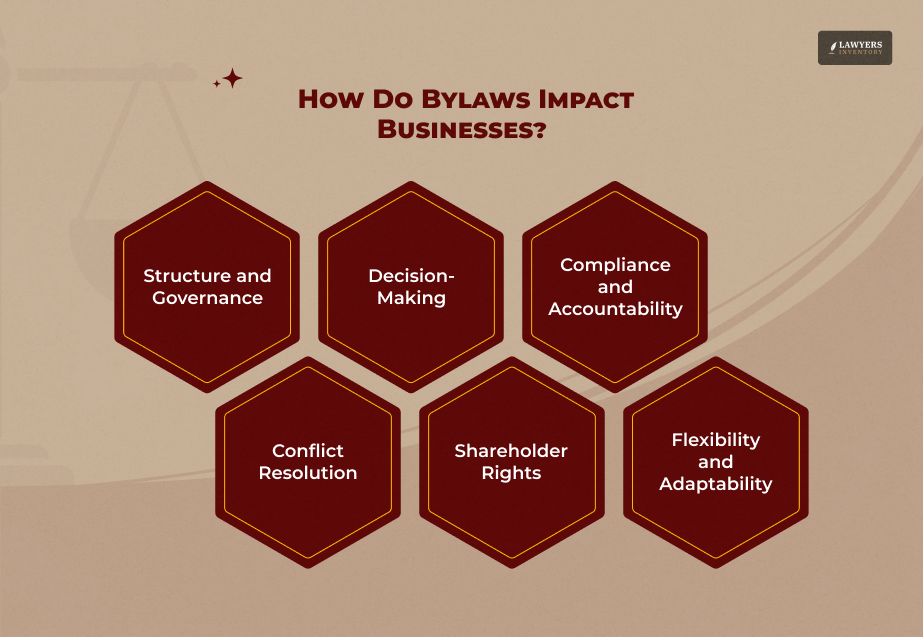
Bylaws are essential rules that govern how a business operates. Additionally, they significantly impact various aspects of a business, ensuring smooth and efficient functioning.
But how does this happen? How do they affect the businesses? Let me break it down for you:
1. Structure and Governance
First, bylaws define the structure of a business, including the roles and responsibilities of the board of directors and officers. This clarity helps avoid confusion and conflicts, ensuring everyone knows their duties and limits.
2. Decision-Making
Secondly, bylaws outline the procedures for making important decisions. This includes how meetings are conducted, votes are taken, and decisions are documented. Clear procedures help in making timely and effective decisions².
3. Compliance and Accountability
Bylaws ensure that a business complies with legal standards and regulations. They promote transparency and accountability by setting guidelines for financial reporting, auditing, and other critical processes.
4. Conflict Resolution
Bylaws provide mechanisms for resolving disputes among stakeholders. This can include procedures for handling conflicts of interest, addressing grievances, and making amendments to the bylaws.
5. Shareholder Rights
Bylaws protect the rights of shareholders by defining their voting rights, how dividends are distributed, and how shares can be transferred. This helps maintain a fair and equitable relationship between the company and its investors.
6. Flexibility and Adaptability
Finally, well-crafted bylaws allow a business to adapt to changing market conditions. Additionally, they provide a framework for making strategic decisions that align with the company’s goals and objectives. Therefore, it ensures long-term growth and success.
What to Do When Bylaws are NOT Followed?
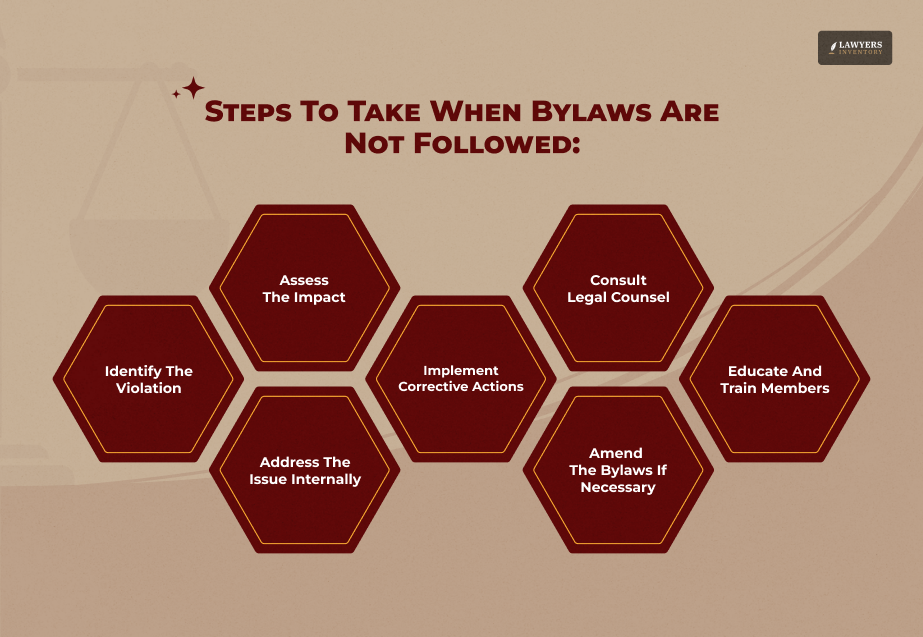
So, as I have already mentioned, bylaws are like the foundation of any/all organization. It outlines its rules, structure, and procedures.
But what happens if these bylaws are not followed?
Failing to adhere to bylaws can lead to confusion, disputes, and even legal trouble, whether it’s a nonprofit, corporation, or association.
Here’s a step-by-step guide to addressing such situations in a clear, effective way:
1. Identify the Violation
The first step is to identify what part of the bylaws wasn’t followed. Review the document carefully to understand the rule or guideline that was ignored. This ensures you have a clear basis for addressing the issue. For example, if a required quorum wasn’t met during a vote, this could invalidate the decision.
2. Assess the Impact
Secondly, not all bylaw violations are equally severe. Determine how the breach affects the organization. Does it create financial risks, legal liabilities, or operational disruptions? For minor issues, a discussion among board members may suffice. For major breaches, you may need to escalate the matter.
3. Address the Issue Internally
Thirdly, you can resolve most bylaw issues within the organization. Bring the matter to the attention of the board of directors or governing body. Additionally, use official channels, such as a meeting or written communication, to highlight the violation and suggest corrective actions. Transparency and collaboration are key here.
4. Implement Corrective Actions
Once the issue is acknowledged, it’s time to fix it. This could involve revoting a decision, providing missing documentation, or restructuring processes to ensure compliance. Ultimately, the goal is to uphold the integrity of the organization.
5. Consult Legal Counsel
For serious violations, especially those involving financial mismanagement or legal risks, seek advice from an attorney. For instance, a legal expert can help determine whether additional steps, such as reporting the issue or amending the bylaws, are necessary to protect the organization.
6. Amend the Bylaws if Necessary
Sometimes, violations occur because bylaws are outdated, unclear, or impractical. If so, consider revising the bylaws to make them more relevant to the organization’s current needs. Furthermore, ensure the amendment process follows the procedures outlined in the existing bylaws.
7. Educate and Train Members
Finally, prevention is always better than cure. Once the issue is resolved, take steps to ensure members, board directors, and employees understand the bylaws. Moreover, regular training and open communication can help prevent future violations.
Bylaws are Crucial for the Effective Governance of a Business
In conclusion, by addressing bylaw breaches promptly and effectively, organizations can maintain trust. Additionally, they will be able to minimize risks and continue to operate smoothly.
Always remember: bylaws exist to guide and protect the organization, so it’s important to treat them with the respect they deserve.
If you were searching for information about what bylaws are, I hope that this blog has been of help to you. They provide a clear framework for operations, decision-making, and compliance, helping businesses run smoothly and efficiently.
If there are any other questions that you might have related to the same, please feel free to let me know. Besides, all you need to do is scroll down until you reach the page’s bottom.
Then, leave your comments and suggestions in the box below. And I will be there to answer them all for you!
Read Also:
- Who Is A Partnership Dispute Lawyer, And When Do You Need One?
- Who Is A Business Attorney? What Does A Business Attorney Do?
- How to Change Your Name After Divorce? Must Read!




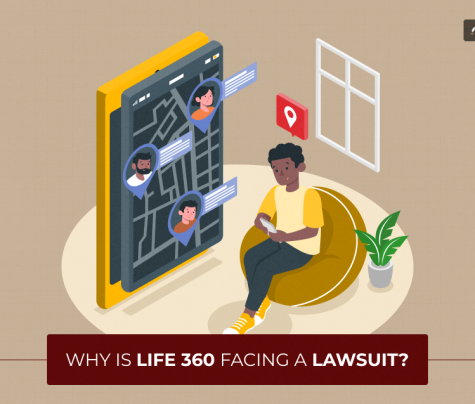
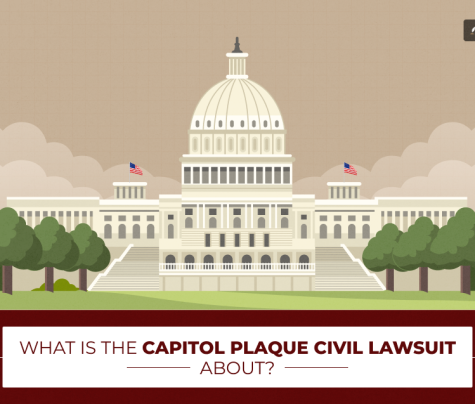
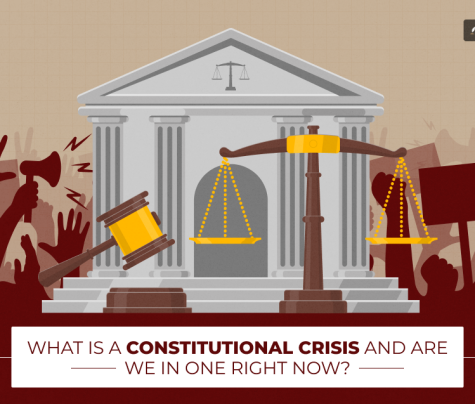



1 Reply
Biden's Offshore Oil Leasing Plan Calls For Historic Reduction
October 3, 2023 at 7:37 am
[…] What Are Bylaws? […]
Reply